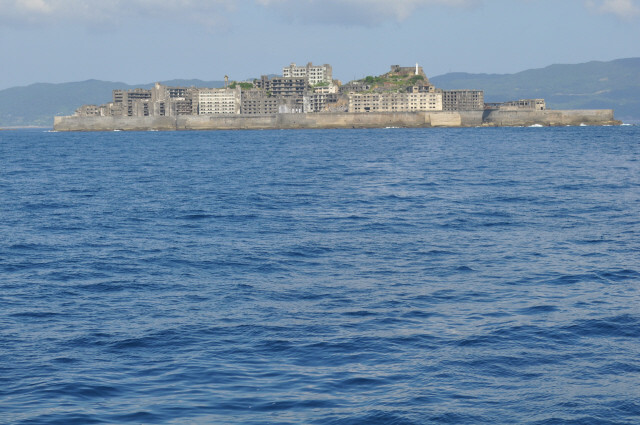hankyoreh
Links to other country sites 다른 나라 사이트 링크
Japan to open information center on Hashima Island and other Meiji sites

The Japanese government will be opening an information center in Tokyo to promote the sites of Japan’s Meiji Restoration (industrial revolution), including the famous Hashima Island, also known as “Battleship Island,” where hundreds of Koreans were drafted to perform forced labor. The center will reportedly claim that Koreans suffered no discrimination on Hashima, which is likely to provoke allegations that Japan is trying to distort the history of Korean victims of forced labor.
The Japanese government was set to hold a launch party for the information center about Meiji industrial sites at the second annex office of the Ministry of Internal Affairs and Communications, in the Shinjuku ward of Tokyo, on Mar. 31, Japanese newspaper Sankei Shimbun reported. Given the spread of COVID-19, only people connected with the center attended the party, and the center itself won’t be opened to the public for now. The center will feature video testimony of 36 residents of Hashima, including a second-generation Korean-Japanese who was on the island during World War II. This Korean-Japanese is quoted as saying, “I was never bullied by the people around me,” implying that forced labor didn’t occur.
Japan sought to register 23 coal mines, iron refineries, and other sites in Japan — including Hashima, in Nagasaki Prefecture, which is infamous for the forced labor performed by Koreans — as UNESCO world heritage sites. South Korea’s Ministry of Foreign Affairs opposed the registration of the sites, while UNESCO wanted the two sides to resolve the issue on their own. Japan finally convinced UNESCO to register the sites in 2015 after it promised to set up an information center that would bring attention to the history of Korean forced laborers.
“Koreans and others were mobilized against their will and subjected to forced labor during the 1940s [in some industrial facilities, including Hashima]. We will set up an information center to commemorate the victims,” said a representative for the Japanese government during the UNESCO deliberations.
But concerns have been raised that, now that the Meiji industrial sites are registered with UNESCO, the Japanese government intends to use the center to distort or erase the history of Korean victims of forced labor. No mention is made of those victims in the second conservation status report that Tokyo submitted to UNESCO in December 2019, in which it was supposed to describe follow-up measures for the Meiji industrial sites.
“We will take direct action to inform the World Heritage Center, which handles the implementation report, that the Japanese government is not fulfilling its obligations. We will also call on Japan to implement [its agreements] in multilateral forums such as the World Heritage Committee,” said an official from South Korea’s Ministry of Foreign Affairs at the time.
The information center is operated by an organization called the National Congress of Industrial Heritage. This organization, which the Japanese government commissioned to research labor issues in connection with Meiji industrial sites, has continued to produce reports that downplay or deny the forced labor performed by Koreans.
“We focused on primary sources and on the testimony of people familiar with those times. We listened to the stories of people who used to live on [Hashima] island, but we didn’t hear any testimony about Koreans being abused. We intend to let visitors draw their own conclusions,” said Koko Kato, managing director of the National Congress, in an interview with the Sankei Shimbun.
By Cho Ki-weon, Tokyo correspondent
Please direct comments or questions to [english@hani.co.kr
Editorial・opinion
![[Editorial] Does Yoon think the Korean public is wrong? [Editorial] Does Yoon think the Korean public is wrong?](https://flexible.img.hani.co.kr/flexible/normal/500/300/imgdb/original/2024/0417/8517133419684774.jpg) [Editorial] Does Yoon think the Korean public is wrong?
[Editorial] Does Yoon think the Korean public is wrong?![[Editorial] As it bolsters its alliance with US, Japan must be accountable for past [Editorial] As it bolsters its alliance with US, Japan must be accountable for past](https://flexible.img.hani.co.kr/flexible/normal/500/300/imgdb/original/2024/0417/6817133413968321.jpg) [Editorial] As it bolsters its alliance with US, Japan must be accountable for past
[Editorial] As it bolsters its alliance with US, Japan must be accountable for past- [Guest essay] Amending the Constitution is Yoon’s key to leaving office in public’s good graces
- [Editorial] 10 years on, lessons of Sewol tragedy must never be forgotten
- [Column] A death blow to Korea’s prosecutor politics
- [Correspondent’s column] The US and the end of Japanese pacifism
- [Guest essay] How Korea turned its trainee doctors into monsters
- [Guest essay] As someone who helped forge Seoul-Moscow ties, their status today troubles me
- [Editorial] Koreans sent a loud and clear message to Yoon
- [Column] In Korea’s midterm elections, it’s time for accountability
Most viewed articles
- 1[Column] The clock is ticking for Korea’s first lady
- 2Samsung barricades office as unionized workers strike for better conditions
- 3[Editorial] When the choice is kids or career, Korea will never overcome birth rate woes
- 4[News analysis] After elections, prosecutorial reform will likely make legislative agenda
- 5S. Korea, Japan reaffirm commitment to strengthening trilateral ties with US
- 6Why Israel isn’t hitting Iran with immediate retaliation
- 7[Guest essay] How Korea turned its trainee doctors into monsters
- 8Japan officially says compensation of Korean forced laborers isn’t its responsibility
- 9[Editorial] Does Yoon think the Korean public is wrong?
- 10[Editorial] 10 years on, lessons of Sewol tragedy must never be forgotten